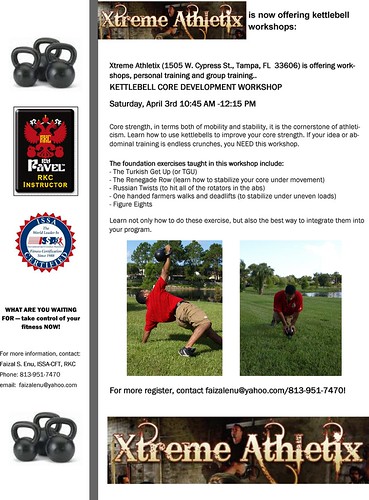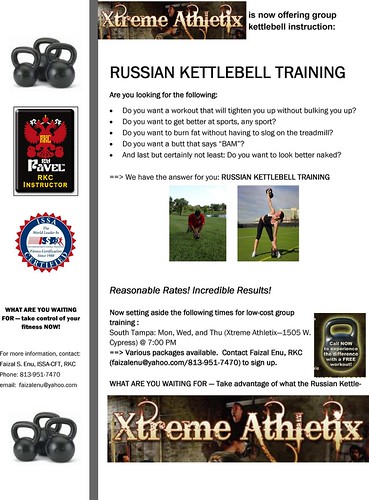I did a very good but simple workout today that got me thinking about how we measure our workouts. Specifically, I was thinking about KPIs, or Key Performance Indicators.
First, here was the workout:
10 Goblet Squats
10 Snatches Left
10 Snatches Right
10 Hand to Hand swings
10 rounds for time
Nothing special or fancy, but a good simply MetCon type of workout. I completed this in
18:17 with the 24kg bell. I think that was pretty good, but how would I measure this? This got me thinking of other metrics that maybe can or should be used. In a former life I was a consultant, and one of the challenges that we typically face is determining performance metrics that matters.
First, let's look at some of the terms we already use:
% of 1RM - this is a measure of workout intensity, typically used by powerlifters for expressing the weight on the bar as a percentage of there PR. I personally believe this is an excellent measure for intensity for powerlifts, but hard for more complicated workouts or those not based on limit strength.
Another commonly used metric is
total weight lifted. This is a measure of workout volume. I have a problem with this -- how do I measure swings vs. snatches. 100 32kg swings is way ddifferent than 100 32kg snatches, but not according to this metric. Similar arguments can be made for people that use total weight lifted/minute as a metric for workout density.
Total calories burned: Now that we have pretty accurate heart rate monitors, we have pretty good estimate of total calories burned during a workout. A lot of people use this for determining how many calories they have burned during exercise. This would be a measure of energy input (as opposed to mechanical work output). If weight loss is your goal, this is ideal. To be honest, I really don't like the idea of wearing a heart rate monitor. Also, this is an indirect vs. a direct measure of calculating calories expended. Also, I wonder what the reliability of this data is with aerobic, glycolytic, and CP energy systems. Also, this is a measure of energy expended, not my performance.
Now lets get back to the original example. We could certain apply the performance measures that we described above. That being said, I have some ideas for others based on my past experience as a consultant:
* Work done (measure of volume) I think a better measure of WORKout volume would be to measure the amount of WORK done. In this context, I am talking about mechanical work done. In most lifting contexts,
Work Done = sum(Weight Lifted x Height Lifted). It is not just the weight lifted, but also how high this is lifted. This is why 200 swings is very different from 200 snatches. This would typically be measured in ft-lbs (English units) or Joules (metric units). There are a few things I like about this:
1. It allows you to compare completely dissimilar workouts
2. For those looking to lose weight, we are measuring the WORK, which is also described as the change in potential ENERGY. Fat is stored ENERGY. See the similarity.
3. For those looking to build muscle, this measure of volume would explain why squats and long-cycle clean and jerks are two of the best mass builders. You are moving big weights big distances.
Work/Unit Time: A similar argument can be used for using work/unit time rather than weight/unit time. Also work/unit time is close to what we would call POWER if we were describing machines. In most field sports, typically we are more concerned with power (speed strength) rather than strength or total work done.
* Utilization: In a workout, this would be defined as: Time Under Load/Total Workout Time. It is a measure of "activity". In this context, it would essentially be a work/rest ratio, but expressed as a percent of time working over the entire activity.
* Nominal Utilization: this would be defined as Nominal Time Under Load/Total Workout Time. The Nominal Time Under Load would be based on assumptions on how long a given repetition would take. This way you could have a measure of utilization without having to keep track of stopping and starting. Also, since we are using "assumed" rather than "actual" time per rep, this would be a measure of "productivity" vs. "activity".
* Efficiency: In a machine this would simply be the (Work Done)/(Energy Expended). Why not measure the same thing for the body. I would think that the higher efficiency would indicate a higher level of skill in the movement. We could calculate the external work done, we can estimate the energy expended from heart rate. What would be interesting would be to:
- Track this over time. I would imaging that the more practice and skill the athlete has, the more efficient they would be.
- Tract this at different workloads. I would bet that if I did the same workout with a 32kg bell, I would be LESS efficient at the workout. Usually the higher you rev an engine, the more inefficient it becomes.
Suprisingly, there has been very little research in this area, and most of it is conjecture and not experimental.
Let me take the workout from above and calculate the new stats from above.
WORK DONE BW EW Sets Reps Reps Distance Work
Goblet Squats 182 53 10 10 100 3 70500
Snatch Left 53 10 10 100 5.5 29150
Snatch Right 53 10 10 100 5.5 29150
Swings 53 10 10 100 2.5 13250
Total 142050 ft-lbA lot of the numbers here are SWAGs and there are assumptions. According to my calculations, I did about 142K foot-lbs of work. In and of itself this is not a useful number, but what would be interesting is how this would compare to:
* An ETK ladder workout (including presses and swings)
* An RTK workout
* An HoC workout
* A different MetCon/circuit
* A typical boot camp workout
The great thing about this is you could do this for any workout where you are lifting things.
WORK DONE/UNIT TIMEBy simply dividing the WORK DONE by the numbber of HOURS worked (about .304), I get a work/hour of 466162 ft-lbs/hr. Again, useless on its own, could be extremely useful when comparing different workouts OR even the same workout, but different reps schemes and/or resistance. Trainers can use this when determining optimal training plans for their clients, among other things of course.
Utilization: During this workout, I would say that I rested about about 30s per set, and there were 9 rest periods. Therefore the utilization is about 75.4% (817 s/1097 s). Again, the hard part about this is that you have to measure actually time working, which is impractical for all but the simplest of workouts. This gives rise to...
Nominal Utilization: This would be a measure of productivity based on assuming a set of ideals for how long each repitition would take. Based on 2s/squat, 2s/snatch, and 1.5s/swing, each complex takes about 75s, for a total workout time of 750s. This leads to a nominal utilization of 68.4% (750s/1097s). Please note, my first set through took about 75s, so I think my assumptions are valid and relevant.
Another way of looking at this is that while I was active 75.4 of the time, I was productivity was only about 68.4%. Granted, this is based on the assumptions that I used. For example, during the TSC snatch test, I had a client get 131 reps, pretty good eh. He never put the bell down, so his utilization would be 100%. Nominal utilization was 87.3%, since there was time lost to hand switches, more rest at the top, slower snatches, and maybe loopier snatches.
In my workout, if I worked straight through without resting at all AND with no loss of performance it would have taken me 12:30.
* I lost 5:47 against this standard over the duration of the workout
* I rested about 4:30 during the workout
* The means I lost the difference (1:17) due to descreaed performance.
This gives me an idea of what I need to do to improve. Let me know what you think of these metrics.




